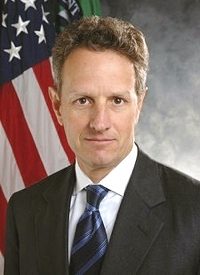
Although Monday, May 16th is the day the financial world was supposed to end as the federal government’s spending hit the debt ceiling, Treasury Secretary Timothy Geithner (left) announced that he was able to put off that day of reckoning until August 2nd. In a letter to Congress, Geithner said that by borrowing from a pension fund belonging to federal workers and from an emergency fund set up to “help deal with foreign financial crises” coupled with slightly higher tax revenues than expected, he is able to stave off the inevitable until early August. But he warned that failure to raise the debt ceiling by that date “would have a catastrophic economic impact.”
Geithner’s warnings are just part of a chorus of similar concerns emanating from the Washington establishment. In a letter to Senate Majority Leader Harry Reid and Speaker of the House John Boehner, some 60 trade associations and Wall Street institutions threatened that “The failure to increase the statutory debt limit in a timely fashion could have a significant and long-lasting negative impact on the U.S. economy. ” Signers included such worthies as the Securities Industry and Financial Markets Association (SIFMA), the Financial Services Roundtable, the U.S. Chamber of Commerce, the National Association of Manufacturers, and the Investment Company Institute.
Matthew Zames, Chairman of the Treasury Borrowing Advisory Committee, added to the cacophony of concern in his letter to Geithner:
{modulepos inner_text_ad}
Any delay in making an interest or principal payment by Treasury even for a very short period of time would put the U.S. Treasury and overall financial markets in uncharted territory, and could trigger another catastrophic [there’s that word again] financial crisis.
Zames then reviewed “five developments that could likely occur if Treasury were to default on its obligations as a result of a failure to raise the debt limit in a timely manner,” which included the possibility that foreign investors might reduce their holdings of U.S. debt, resulting in higher interest rates to the Treasury. It also might entail a real downgrade in the U.S.’s credit rating, a run on money market funds as investors liquidate their holdings and a disruption in the Treasury’s $4 trillion financial efforts. All of which, of course, would be bad for the economy, according to Zames.
All of which is simply “clamor and hyperbole,” according to Stanley Druckenmiller, founder of the $12 billion Duquesne Capital investment empire, and former associate of CFR insider George Soros. Working together with Soros in the early 1990s, they shorted the British pound in a spectacular and highly profitable bet that the British government couldn’t support the pound. The event is referred to as Black Wednesday and netted the duo $1.1 billion in profits.
In a rare interview for the Wall Street Journal, Druckenmiller said “I think…default would be horrible, but I don’t think it’s going to be the end of the world. What’s going to be catastrophic is if we don’t solve the real problem [Washington’s continued spending binge].”
I’m just flabbergasted that we’re getting all this commentary about catastrophic consequences, including from the chairman of the Federal Reserve [Ben Bernanke], about this situation. But none of these guys bothered to write letters…about the real situation which is we’re piling up trillions of dollars of debt.
Druckenmiller then offered two options that are facing bond investors: one, if the government makes massive cuts in entitlements, and two, if it doesn’t.
Number One:
I own this piece of paper. I get an income stream…over 10 years…and one of my interest payments is going to be delayed, I don’t know, six days, eight days, 15 days, but I know I’m going to get it. There’s not a doubt in my mind that it’s not going to [be paid]. In exchange for that…I know I’m going to get massive cuts in entitlements and the government is going to get their house in order so my payments seven, eight, nine, 10 years out are much more assured.
And then there’s Paper Number Two:
I don’t have to wait six, eight, or 10 days for my payment. I get it on time. But we’re going to continue to pile up trillions of dollars of debt and I may have a Greek situation on my hands in six or seven years.
Now, as an owner, which piece of paper do I want to own? To me it’s a no-brainer. It’s piece of paper Number One.
Druckenmiller took a similar position back in 1995 when then Treasury Secretary Robert Rubin was trying to scare the wits out of the investment community, claiming all manner of disaster awaited if the debt ceiling (then at $5 trillion) wasn’t raised. In actual fact, he remembered, “the bond market rallied throughout the period of the so-called train wreck…and, by the way, continued to rally. Interest rates went down the whole time, past the government shutdown deadline, and really interest rates never went back up again until the Republicans caved [in on the debt ceiling].”
According to Druckenmiller, the worst thing that could happen would be for the Republicans to cave in once again. But he thinks the Obama administration will do the caving this time: “If they believe what they’re saying, they’ll cave. If they believe this is Armageddon and this is worse than Lehman and this is the greatest catastrophe ever, they’ll cave. ”
And how is Druckenmiller playing his hand today? He has a substantial long position in U.S. Government Treasuries, expecting Washington to get its act together, and select Door Number One.



